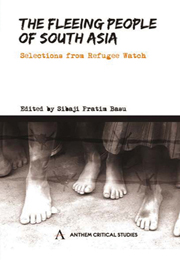Book contents
- Frontmatter
- Contents
- Acronyms and Abbreviations
- Foreword by Ranabir Samaddar
- Preface
- ETHICAL ISSUES
- LAWS
- SOUTH ASIA
- Introduction
- Refugees in South Asia: An Overview
- Internally Displaced Persons in Sri Lanka
- A Matter of Ethnicity
- Scrutinizing the Land Resettlement Scheme in Bhutan
- The Taliban Shelter Seekers or Refugee Warriors?
- Afghan Refugees head for Tajikistan, holed up in the Pamir Mountains
- Impact of International Jurisdiction on Afghan Refugee Rights
- Development Induced Displacement in Pakistan
- On the Trail of Burma's Internal Refugees
- Assault on Minorities in Bangladesh: An Analysis
- Neoliberal Globalization and Women's Experiences of Forced Migrations in Asia
- Who Went Where and How are They Doing? Pakistanis and Indians Outside South Asia
- INDIA
- GENDER
- INTERVIEW/CORRESPONDENCE
- REPRESENTATIONS
- Index
Afghan Refugees head for Tajikistan, holed up in the Pamir Mountains
A Correspondent
from SOUTH ASIA
Published online by Cambridge University Press: 05 March 2012
- Frontmatter
- Contents
- Acronyms and Abbreviations
- Foreword by Ranabir Samaddar
- Preface
- ETHICAL ISSUES
- LAWS
- SOUTH ASIA
- Introduction
- Refugees in South Asia: An Overview
- Internally Displaced Persons in Sri Lanka
- A Matter of Ethnicity
- Scrutinizing the Land Resettlement Scheme in Bhutan
- The Taliban Shelter Seekers or Refugee Warriors?
- Afghan Refugees head for Tajikistan, holed up in the Pamir Mountains
- Impact of International Jurisdiction on Afghan Refugee Rights
- Development Induced Displacement in Pakistan
- On the Trail of Burma's Internal Refugees
- Assault on Minorities in Bangladesh: An Analysis
- Neoliberal Globalization and Women's Experiences of Forced Migrations in Asia
- Who Went Where and How are They Doing? Pakistanis and Indians Outside South Asia
- INDIA
- GENDER
- INTERVIEW/CORRESPONDENCE
- REPRESENTATIONS
- Index
Summary
Up to 150,000 people in northern Afghanistan are said to be fleeing from advancing Taliban forces and making their way to the Tajikistan border. European aid workers in the area say the refugees are in a desperate situation – without food, shelter or medicines. The refugees are sheltering in the Pamir Mountains, a remote and inaccessible area near the international border, which has been closed by the Tajikistan government. […] ‘These people have nowhere to go. There is no food, no shelter, no equipment or medicine’, Afghan affairs expert, Ahmed Rashid, told BBC World Service radio from Lahore, Pakistan. […]
Aid workers say they are unable to reach the refugees because of the remoteness of the area. UN officials are now in Kabul trying to persuade the Taliban to allow aid convoys through before snow blocks roads and leaves the refugees stranded. The winter in the Pamir Mountains is only six weeks away and there is an urgent need to get food stocks to the refugees to last them through the winter months. The Taliban, which captured power in 1996, control 90 per cent of the country with just a small bit of territory in the north holding out. They have made several attempts to capture the remaining 10 per cent and extend their rule to the entire country.
- Type
- Chapter
- Information
- The Fleeing People of South AsiaSelections from Refugee Watch, pp. 172 - 173Publisher: Anthem PressPrint publication year: 2009

